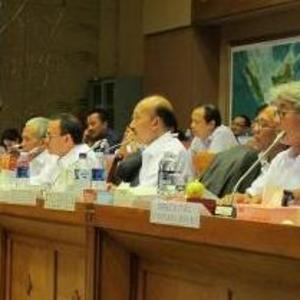Indonesia ups biodiesel subsidy from 45 cents per gallon to $1.19

Photo: Ministry of Energy and Mineral Resources, Republic of Indonesia
February 6, 2015
BY Ron Kotrba
The Indonesian House of Representatives has approved an increase in the nation’s biodiesel sales subsidy from Rp 1,500 per liter to Rp 4,000 per liter (44.7 cents per gallon to $1.19 per gallon), according to a press release from the Ministry of Energy and Mineral Resources, Republic of Indonesia.
The ministry had proposed an increase in the biodiesel subsidy from Rp 1,500 per liter to Rp 5,000 per liter (44.7 cents per gallon to $1.49 per gallon) but the energy ministry said the House commission overseeing energy (Commission VII) assessed the rate of Rp 5,000 per liter proposed by the energy ministry as “too big.” The commission made this determination after considering prevailing international biodiesel prices, the ministry said.
The ethanol subsidy increase from Rp 2,000 per liter to Rp 3,000 per liter (59 cents per gallon to 89 cents per gallon), as proposed by the ministry, was also approved.
Advertisement
Advertisement
Indonesia has a strong biofuel use program in place, mandating 10 percent biodiesel and 3 percent ethanol.
Advertisement
Advertisement
Related Stories
The government of Australia on Sept. 17 announced plans to invest AU$1.1 billion ($731.84 million) to support the domestic production of drop-in, low-carbon liquid fuels, such as renewable diesel and sustainable aviation fuel (SAF).
EPA releases rulemaking to reallocate waived RFS volumes, biofuel industry expresses cautious optimism
The U.S. EPA on Sept. 16 released a supplemental notice of proposed rulemaking (SNPRM) that considers several options for reallocating RFS renewable volume obligations (RVOs) waived under the small refinery exemption (SRE) program.
The U.S. EPA on Sept. 12 released a proposed rule to end the Greenhouse Gas Reporting Program. If finalized, the proposal would remove reporting obligations for most large facilities, all fuel and industrial gas suppliers, and CO2 injection sites.
The Coalition for Renewable Natural Gas and American Fuel & Petrochemical Manufacturers in September filed separate lawsuits challenging the U.S. EPA’s final rule to partially waive 2024 cellulosic blending obligations under the RFS.
Sen. Chuck Grassley on Sept. 10 called the U.S. Treasury Department’s planned May 2026 release of proposed 45Z clean fuel production credit regulations “unacceptable” and stressed the importance of timely 45Z guidance to two Treasury nominees.
Upcoming Events










